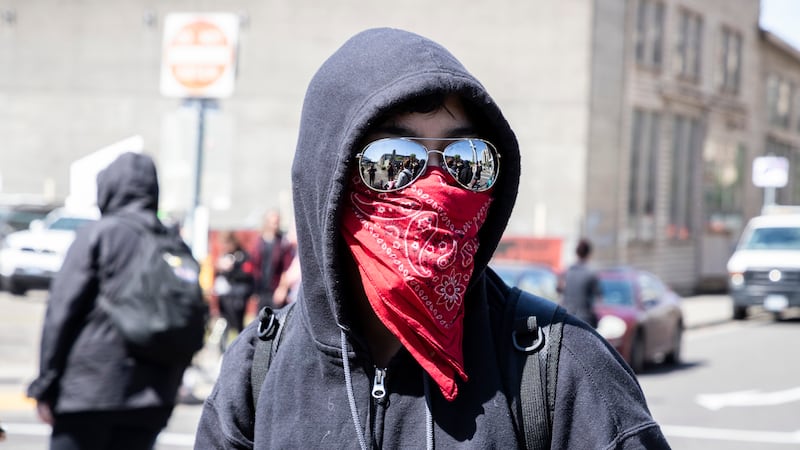In her first extensive public comments about last weekend's violent protest, Portland Police Chief Danielle Outlaw suggested today the city should ban masks at protests.
It is the most direct suggestion of a change in local laws to address violence at protests proposed by a city official since Mayor Ted Wheeler tried to pass an emergency protest ordinance that would have allowed police to place restrictions on demonstrations that could become violent.
"In other states, you'll see that it's illegal to wear a mask during the commission of a crime," Outlaw said at a press conference July 3. "If you knew that you could be easily identified, do you think you would be as inclined to commit that act of violence, or commit that crime?"
The suggestion would appear to target antifascist demonstrators, some of whom wear masks and dress in black to conceal their identities. An assault committed by antifascists in Portland on June 30 has drawn national media attention.
The far-right groups who plan frequent rallies in Portland that often devolve into violent skirmishes typically do not conceal their identities. The far-right organizers have admitted publicly that their intention is to bait antifascists into violence, either with right-wing supporters or the police.
The Police Bureau and the mayor's office did not immediately respond to follow-up questions about Outlaw's suggestion to make it illegal to wear a mask at a protest.
The American Civil Liberties Union of Oregon is skeptical an anti-mask law would pass constitutional muster.
“There are many legitimate reasons why a person might want to wear a mask,” says Kimberly McCullough, the ACLU’s policy director. “People who wear clothing that covers their faces for religious reasons. They may be going somewhere they don’t want to be recognized: at treatment centers for certain types of illnesses; at a protest where they might be recognized by boss or landlord or overbearing parents; people might fear being doxxed; they might be worried about an abusive ex-partner; they might be worried about tear gas or pepper spray.”
McCullough says masks can also be a part of protected speech, either for expressive or religious reasons. Even if an anti-mask law would be effective, it may easily violate the First Amendment.
“I don’t know that we could ever overcome the First Amendment implications here,” she says. “We would be chilling all sorts of legitimate uses of masks. I don’t think you can overcome that by saying it’s going to work really well.”
The fact that such a law would apply primarily to antifascist groups could renew questions about which brawlers the city sees as a threat.
The Portland Police Bureau is under an external investigation looking into allegations that officers show bias against leftist demonstrators, particularly antifascists protesting far-right extremists. Wheeler ordered the inquiry after WW and the Portland Mercury published friendly texts between a police lieutenant and Patriot Prayer leader Joey Gibson.
Portland police have rarely arrested unmasked brawlers at past protests, even when they have been caught kicking, punching, and striking people with weapons on video. Police and prosecutors have pointed to "mutual combat" and a lack of cooperative victims as reasons for the inaction. WW's reporting revealed that mutual combat is not a defense under Oregon law.
There has been at least one high-profile exception, when the Portland police arrested Tusitala "Tiny" Toese for punching a protester at a Dec. 9, 2017 rally. Police again arrested Toese for a June 2018 assault, who was eventually prosecuted after WW reported on the large quantity of video evidence and testimony against him.
A spokeswoman for Wheeler's office says the mayor will be discussing this suggestion further.
"We're going to talk with Chief Outlaw more about this suggestion," says Wheeler's spokeswoman Eileen Park. "We'd also like to get community leaders to weigh in."
